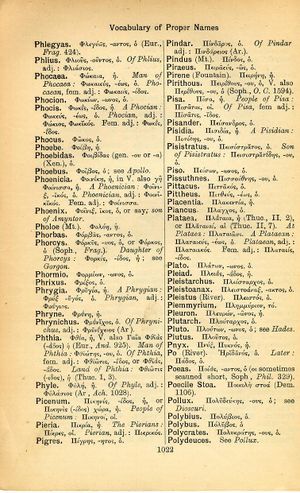Pholoe
χωρίον ἔνθα οὐ προσβατὸν θανάτῳ → a spot where it is not accessible to death, a place where was no point accessible by death, a place where death was forbidden to set foot
English > Greek (Woodhouse)
(Mt.) Φολόη, ἡ.
Latin > English (Lewis & Short)
Phŏlŏē: ēs, f., = Φολόη.
I A forestclad mountain in Arcadia, on the borders of Elis, Plin. 4, 6, 10, § 21; Ov. F. 2, 273; Stat. Th. 10, 228.—
II A mountain in Thessaly, the abode of the Centaurs, Luc. 3, 198; Stat. Achill. 1, 138.—Hence,
B Phŏlŏē-tĭcus, a, um, adj., of or belonging to Mount Pholoe, in Thessaly: monstra, i. e. the Centaurs, Sid. Carm. 5, 230.
Latin > French (Gaffiot 2016)
Phŏlŏē,¹³ ēs, f. (Φολόη), Pholoé
1 montagne de Thessalie, habitée par les Centaures : Luc. 3, 198
2 montagne d’Arcadie : Ov. F. 2, 273 ; Plin. 4, 21 || -ētĭcus, a, um, du mont Pholoé : Sid. Carm. 5, 230.
Latin > German (Georges)
Pholoē, ēs, f. (Φολόη), ein waldreiches Gebirge in Arkadien auf der Grenze von Elis, die südl. Fortsetzung des Erymanthus, j. Olono, Ov. fast. 2, 273. Stat. Theb. 10, 228. Plin. 4, 21: Wohnsitz der Zentauren, Lucan. 3, 198. Stat. Ach. 1, 238. – Dav. Pholoēticus, a, um, pholoëtisch, monstra, die Zentauren, Sidon. carm. 5, 230.

